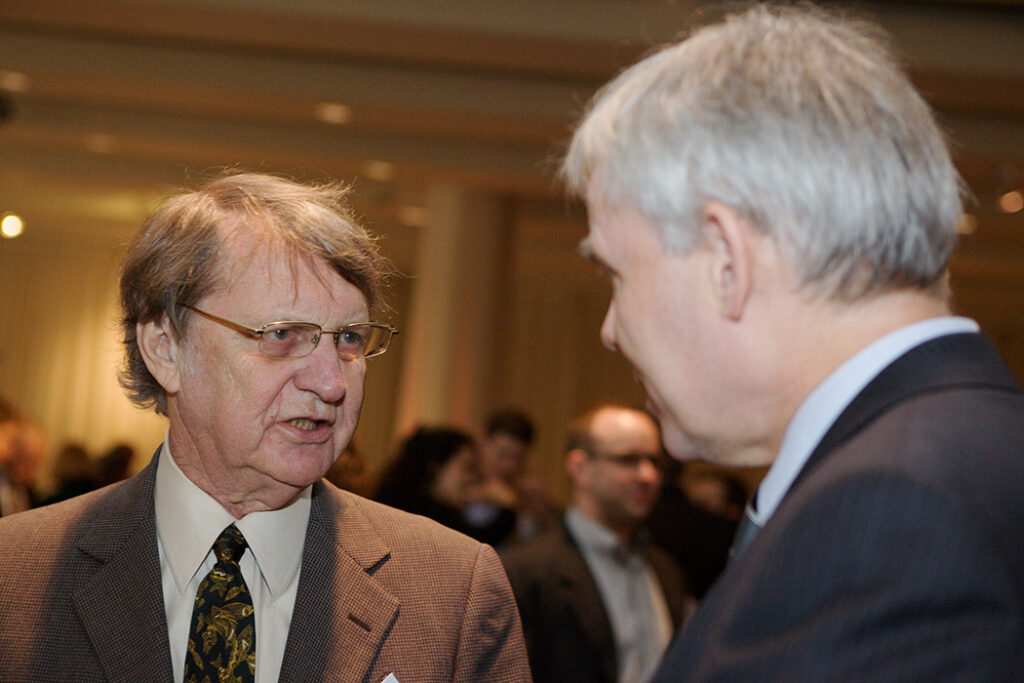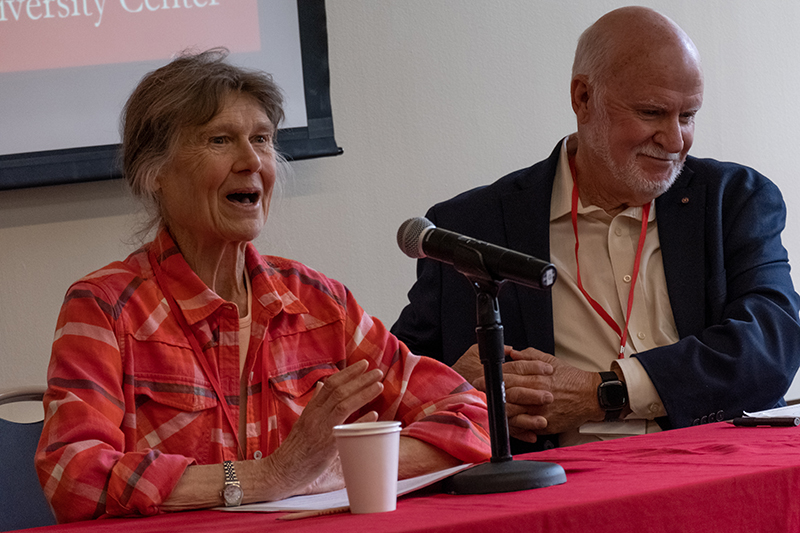Roger Kasperson recalled for helping ‘put Clark on the map’

Roger Kasperson was known internationally as a giant in the study of risk analysis and communication, global environmental change, sustainability science, vulnerability, and resilience, among other areas. From Moscow to Beijing, Stockholm to Potsdam, Washington to New York, his counsel was sought on issues of deep urgency and complexity affecting wide swaths of people.
But during a moving tribute to the late Clark geographer, who died in 2021, speakers also recalled Kasperson as the most unassuming “giant” imaginable — humble, thoughtful, compassionate, and, with his trademark fishing cap atop his head, ever ready to cast a line into the water.
A tribute to Kasperson, moderated by Robert Johnston, director of the George Perkins Marsh Institute, was held April 15 inside a packed Grace Conference Room as part of the Graduate School of Geography centennial celebration. A roster of speakers, as well as audience members, remembered a colleague, mentor, and friend who worked diligently to ensure that science was used for the betterment of society, that Clark University was strengthened, and that individuals in his sphere were always uplifted.
Kirstin Dow, Ph.D. ’96, Carolina Trustees Professor in the Department of Geography at the University of South Carolina, recalled that Kasperson often addressed major policy challenges by recruiting “kindred spirits” from diverse disciplinary backgrounds — including sociologists, economists, geographers, psychologists, and others — to consider diverse perspectives and possible solutions. He was particularly concerned with the human dimensions of decision-making — for instance, regarding the location of radioactive waste disposal sites. Who are the influential voices making the decision of where waste is disposed, he wanted to know. What is acceptable and tolerable risk, and is that risk voluntary, safe, and fair?
Sam Ratick, professor emeritus of the Graduate School of Geography and former director of the George Perkins Marsh Institute, noted that Kasperson “was responsible for my being at Clark and having a career here.” When Kasperson was asked to advise the agency overseeing the siting of radioactive waste disposal facilities in New York state, he emphasized the need for extensive public participation in the decision-making process — a novel approach at the time. At Kasperson’s urging, the process required “responding to reasonable comments,” which meant giving full and respectful attention to the residents’ concerns and recommendations, Ratick said. He recalled a resident disagreeing with the agency’s stance, but thanking them for taking his opinion into consideration.

“Roger and Clark were inseparable,” noted former colleague Susan Hanson, distinguished professor emerita and former GSG director. She spoke of Kasperson growing up on a Northboro, Massachusetts, farm and coming to Clark in 1955 as a scholarship athlete (he earned his Clark degree in 1959). She recalled his long service to the University, which began in 1968 as an assistant professor of geography and government, progressed through a series of positions of increasing responsibility — including dean of the college and provost. His co-founding with fellow professors Robert Kates and Christopher Hohenemser of the Center for Technology, Environment, and Development (later to become the George Perkins Marsh Institute), in tandem with the creation of the accompanying research library (named in honor of his late first wife, research professor Jeanne X. Kasperson), helped “put Clark on the map,” she said.
Kasperson took his administrative duties seriously, always with an eye toward making Clark a better place for students and faculty, Hanson said. “As provost, he was always impeccably honest and compassionate. These [administrative] roles took Roger away from his research, but they did not put a dent into his accomplishments.”
Former GSG director and distinguished research professor Billie Lee Turner, who is the Regents Professor and Gilbert F. White Professor of Environment and Society at Arizona State University, said Kasperson was always intent on pressing against the frontier of “what sustainability science could be,” noting that some of his most-cited work came toward the end of his career.
Echoing Dow’s recollection of Kasperson as a collector of expertise and opinions, Turner said the geographer was a master at “bringing people together to think through all the angles.” One of his abiding memories, he laughed, was of Jeanne passing Roger notes during some of these lively dialogues.
Audience members reflected on Kasperson’s kind and caring nature — exemplified in the encouragement he gave to students and colleagues — and the informal demeanor that made him always approachable. Sharon Krefetz, professor emerita of political science, was interviewed by Kasperson in 1973 as an aspiring professor applying to teach a new course. When she described the course outline, “He listened, and he made me feel so confident,” she remembered. “He said, ‘You have this just the way it should be.’” Twenty years later, Krefetz was serving as dean of the college when Kasperson was provost, which required frequent collaboration. His thoughtful and encouraging attitude hadn’t changed. “His listening was what most impressed me,” she said.
Just before the event ended, a former graduate student of Kasperson’s from the 1980s remarked that the only thing missing from the day was a photo of the legendary professor in his favorite pose, with his feet on the table and his fishing cap on his head.


